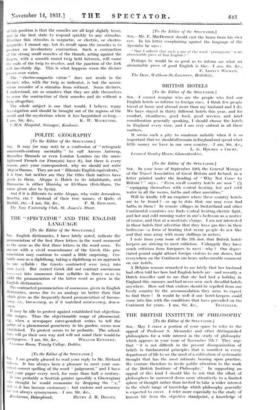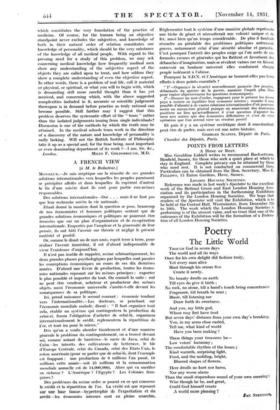THE BRITISH INSTITUTE OF PHILOSOPHY [To the Editor of the
SPECTATOR.]
Sin,—May I crave a portion of your space to refer to the appeal of Professor S. Alexander and other distinguished philosophers for a wide interest in the study of philosophy which appears in your issue of November 7th ? They urge that " it is not difficult in the present disorganization of beliefs in fundamental principles that is manifest in every department of life to sec the need of a cultivation of systematic thought that has the most intimate bearing upon practice.' We venture therefore to invite public attention to the work of the British Institute of Philosophy." In supporting an appeal of this kind I should like to ask that the effort of philosophers be narrowed down more attentively to a limited sphere of thought rather than invited to take a wider interest in the whole range of knowledge which philosophy generally is expected to cover. I refer more especially to the study of human life from the objective standpoint, a knowledge of which constitutes the very foundation of the practice of medicine. Of course, for the human being an objective standpoint never excludes the subjective, and knowledge of both in their natural order of relation constitutes our knowledge of personality, which should be the very substance of the knowledge of all medical people. With regard to the pressing need for a study of this problem, we may ask concerning medical knowledge how frequently medical men show any understanding of the subjective aspect of the objects they are called upon to treat, and how seldom they show a complete understanding of even the objective aspect. In other words, there is a problem of real life, call it material or physical, or spiritual, or what you will to begin with, which is demanding still more careful thought than it has yet received, and concerning which, with the above suggested complexities included in it, accurate or scientific judgement thereupon is in demand before practice as truly rational can become possible. Still further may I suggest that this problem deserves the systematic effort of the " team " rather than the isolated judgements issuing from single individuals? Discussion is -one of the methods by which the truth may be attained. In the medical schools team work in the direction of a discovery of the nature and knowledge of personality is sadly lacking. Will not the British Institute of Philosophy take it up as a special and, for the time being, most important or even dominating department of its work ?—I am, Sir, &c.,
London. MILES F. GOLDSBROUGH,- M.D.-



































 Previous page
Previous page